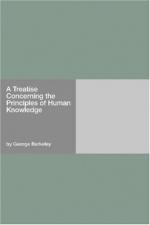5. How difficult and discouraging soever this attempt may seem, when I consider how many great and extraordinary men have gone before me in the like designs, yet I am not without some hopes—upon the consideration that the largest views are not always the clearest, and that he who is short—sighted will be obliged to draw the object nearer, and may, perhaps, by a close and narrow survey, discern that which had escaped far better eyes.
6. A chief source of error in all parts of knowledge.—In order to prepare the mind of the reader for the easier conceiving what follows, it is proper to premise somewhat, by way of Introduction, concerning the nature and abuse of Language. But the unravelling this matter leads me in some measure to anticipate my design, by taking notice of what seems to have had a chief part in rendering speculation intricate and perplexed, and to have occasioned innumerable errors and difficulties in almost all parts of knowledge. And that is the opinion that the mind has a power of framing abstract ideas or notions of things. He who is not a perfect stranger to the writings and disputes of philosophers must needs acknowledge that no small part of them are spent about abstract ideas. These are in a more especial manner thought to be the object of those sciences which go by the name of logic and metaphysics, and of all that which passes under the notion of the most abstracted and sublime learning, in all which one shall scarce find any question handled in such a manner as does not suppose their existence in the mind, and that it is well acquainted with them.
7. Proper acceptation of abstraction.—It is agreed on all hands that the qualities or modes of things do never really exist each of them apart by itself, and separated from all others, but are mixed, as it were, and blended together, several in the same object. But, we are told, the mind being able to consider each quality singly, or abstracted from those other qualities with which it is united, does by that means frame to itself abstract ideas. For example, there is perceived by sight an object extended, coloured, and moved: this mixed or compound idea the mind resolving into its simple, constituent parts, and viewing each by itself, exclusive of the rest, does frame the abstract ideas of extension, colour, and motion. Not that it is possible for colour or motion to exist without extension; but only that the mind can frame to itself by abstraction the idea of colour exclusive of extension, and of motion exclusive of both colour and extension.




